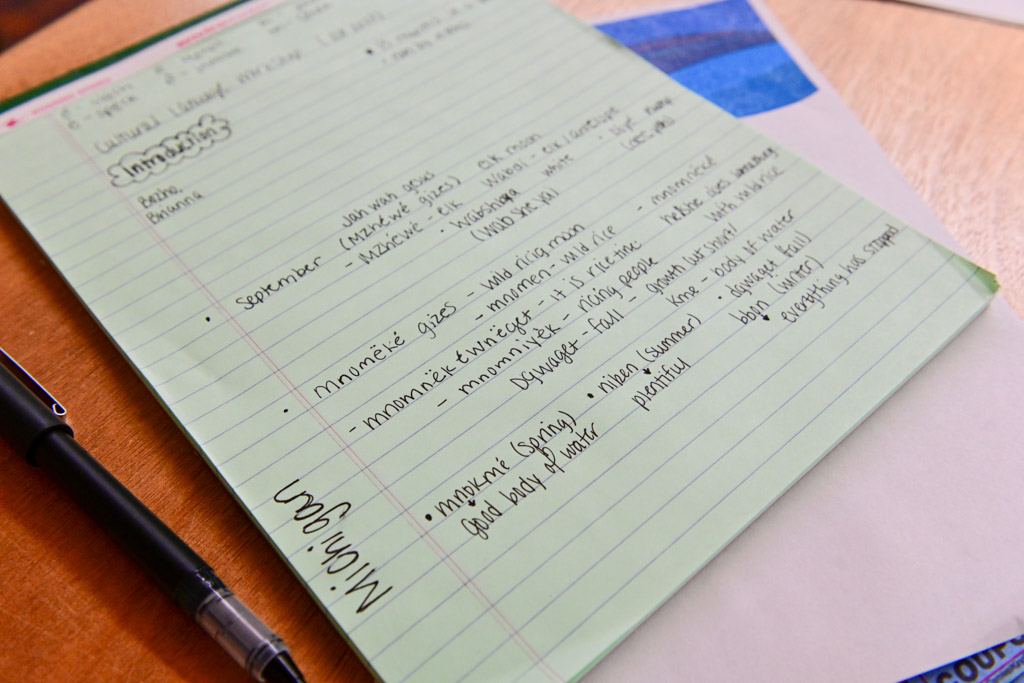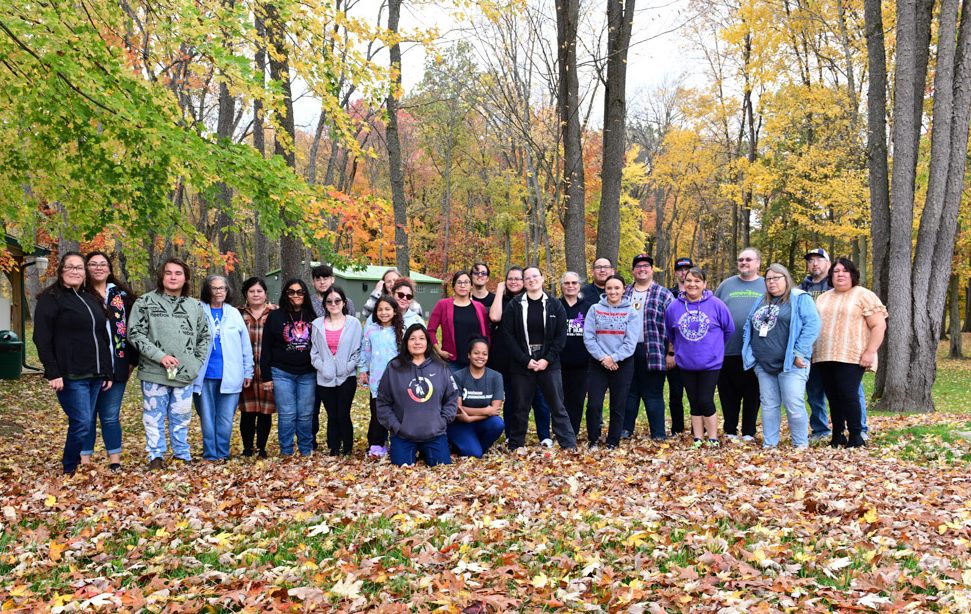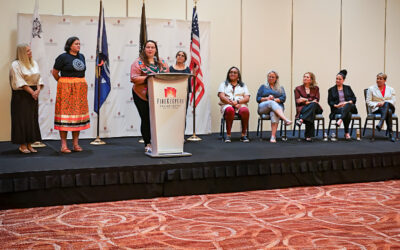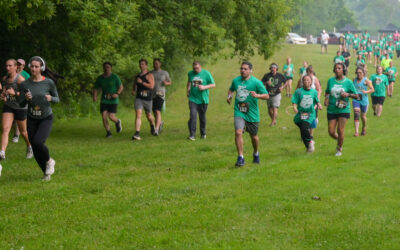Tribal Elder Speaks of Bringing Bodwéwadmimwen Into Her Everyday Life
Written by Leslie McLove | Photos by NHBP Tribal Member and Photographer Johnathon Moulds
“It’s never too late to learn Bodwéwadmimwen {Potawatomi Language}. We need our language. Without it, we lose our Culture. They go hand in hand,” said NHBP Tribal Elder Susan Fierke, who has dedicated the past three years to learning the Potawatomi language. “It is up to each and every one of us to preserve our identity, language and Culture. If I can learn the language, anyone can!”
Fierke and more than two dozen other participants attended the 2023 Fall Language Workshop organized by NHBP Language Coordinator Michael Medawis on October 27. To accommodate Tribal Members like Fierke, who were tuning in from across the U.S., participants had the option to attend the workshop virtually or in person. This all-day event, sponsored by the Culture Department, was filled with fun language activities, games and teaching lessons.
Guest speakers, Advanced Language Specialists Carla Collins and Kyle Malott, along with Language Apprentice Anthony Tibbitts-Warren, who are all from the Pokagon Band of the Potawatomi, were in attendance to lead the learning sessions. It was a hands-on workshop that left each word resonating in the hearts of everyone in attendance.
Collins and Malott underwent a 4-year-long training in Forest County, Wisconsin, working directly with fluent speaker Jim Thunder-bën to bring Bodéwadmimwen back to the Pokagon Band. They are now the bearers of knowledge, casting seeds of language wisdom for the next generation of speakers. Their story of revitalizing Bodwéwadmimwen by rekindling words one learning lesson at a time is inspiring.
The pair works closely with the NHBP Culture Department and leads language-learning opportunities for Tribal Members year-round.
The workshop began with breakfast and an opening session led by Malott, who focused on the pronunciation of the Bodwéwadmimwen names for the autumnal Gizes {moons} and vocabulary words associated with the fall seasons. Periodically, the group paused to allow participants to say each word aloud, inviting each voice to rise and give the Potawatomi language breath. To hear Bodwéwadmimwen rolling off the tongues was an uplifting feeling.
Next up, Tibbitts-Warren led a discussion on sentence structure. This was an opportunity for everyone to learn the components of a sentence. Tibbitts-Warren included details on the basic breakdown of the parts of a sentence.
“The reason language classes are important for me is because I’d like to learn as many words as possible,” said Fierke. “It’s also important to understand how to enunciate the words properly.”
After lunch was served, Collins led the workshop in an interactive ‘Guess Who’ activity revolving around animal habits. Then Malott went on to cover additional autumn-related vocabulary words.

Hosting language learning opportunities like this is vital to the reclamation and revitalization of Bodwéwadmimwen.
“We were given a gift by the creator, and that gift was to be born Neshnabék. We should be looking to the ones before us for guidance on how to live our lives,” said Collins. “We can’t go back to the old ways of living, but we can still learn how they viewed the world through the language. The language keeps us grounded to the earth and what she provides and opens our eyes to more than what is directly in front of us. When our eyes are open, we can appreciate life in a way that was meant for us Neshnabék to see.”
Pursuing language does not end with this workshop; it’s an ongoing effort. Outside of the language events, it’s helpful for participants to continually apply and use the information they learn regularly.
Fierke practices the language online with a friend from the Citizen Potawatomi Nation. Together, the two write and speak the language. Fierke first met this online study partner during one of Collins’ classes, and even had the opportunity to meet her in person during the 2023 Gathering Language Conference.
“It was wonderful to actually meet people in person at the language conference that I have been in class with,” said Fierke, who also turns everyday encounters into opportunities for practice. “I also use the language at home with my husband, children and grandchildren. I have sticky notes on my doors, cupboards, stove, refrigerator etc. that say the words in Bodwéwadmimwen.”
Her story is a testament to the importance of bringing language into our daily lives.
“I wish I had this resource when I was younger. I have enjoyed meeting many people from different bands by participating in the language classes. Not only do I participate in the NHBP language classes via Zoom, but I also attend language classes three times a week with Gun Lake Tribe and two times a week with Prairie Band Potawatomi Nation as well. I feel I need to immerse myself with the language so I will be able to remember it, and so I can speak it as well as understand it when I am hearing it.”
NHBP Tribal Elder Susan Fierke
For those feeling the pull towards Bodwéwadmimwen, but have not yet found the time for classes, allow this message from Collins to be your invitation:
“Always try to learn your language. Your outside body will grow on its own, but your inner soul is always a work in progress. If you find yourself unhappy, feeling like you don’t belong, or like life is missing something, it’s because parts ARE missing that should be there.”
“Once you begin to learn this language, you can feel voids become less empty. If people want to learn, then I think they should do it. It might not be an easy route, but if you want to become fluent or semi-fluent, then you have to get out there and exhaust your study materials and any opportunities you get to attend classes. Learning isn’t easy, but you’re only going to get as far as you make yourself get. It’s not always a struggle, though. Learning can be fun and fulfilling. It is growth!”
While these types of day-long, in-depth workshops only take place a few times per year, NHBP does offer virtual Bodéwadmimwen classes that are held every Thursday night from 5 to 7 p.m. If you are interested in attending, please contact Language Coordinator Michael Medawis at 269.704.4174 or michael.medawis@nhbp-nsn.gov.





0 Comments